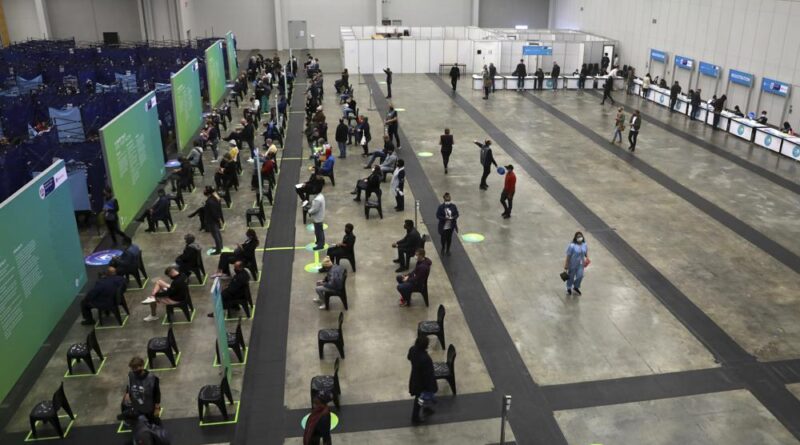Covid-19: South Africa exemplary in Africa vaccine roll-out
The African Union (AU) aims to vaccinate at least 60 per cent of the continent’s 1.2 billion population by 2022.
The organization has appointed South Africa’s President Cyril Ramaphosa to champion Africa’s Covid-19 response strategy, following his successful tenure as chairperson of the AU in 2020.
The AU Commission on Africa’s Covid-19 response was duly established to support the President in his championship role. The focal area is to enhance access to vaccines, accelerate manufacturing and provide significant investment into research and development on the continent.
South Africa’s exemplary national vaccine roll-out programme has influenced the aspirations of the AU.
The country’s innovative risk-adjusted strategy is driven at the highest level by the National Coronavirus Command Council, chaired by President Ramaphosa, and supported by the Inter-Ministerial Committee on Vaccines, chaired by Deputy President David Mabuza.
The multifaceted strategy is based on scientific evidence, which dictated the intervention approach to the virus since it emerged in 2019.
The government’s mass communication and mobilization campaign has been at the forefront of driving consistent messaging on the importance of vaccination, including clarifying the safety and efficacy of the vaccines against the deadly virus. This work has also been supported by research to track the public’s response towards the messages.
The recent research conducted by the Human Sciences Research Council showed that acceptance of Covid-19 vaccines climbed from 67 per cent in January to 72 per cent in August 2021.
There was also a notable 11 per cent increase in the acceptance rate of the age group 55 years and above, which was at 85 per cent. These research findings on vaccine acceptance confirm that vaccine hesitancy no longer poses a serious threat to the roll-out of vaccines to eligible people.
More vaccine sites
Minister of Health, Dr Joe Phaahla, has assured South Africans that the country has enough vaccines.
All the nine provinces have increased their vaccination sites, which include mass pop-up and drive-through locations. Free transport has also been provided for those unable to access the vaccination sites.
Some of the innovations in other provinces include house visits, especially to senior citizens and persons with disabilities.
The vaccine roll-out programme, which is the most extensive the country has ever undertaken, now includes people aged 18 years and above. The success of this roll-out programme will certainly reduce the burden on the healthcare system, the economy and society at large.
As part of the continent’s interventions to fight the virus, South Africa continues to foster collaboration with other regions, businesses, and multinationals to boost the region’s access to vaccines.
Africa remains resolute to become self-sustainable in respect of vaccine production for this and any future pandemics.
African Development Bank (ADB) President, Dr Akinwumi Adesina, said the ADB had invested US$5 billion to support vaccine manufacturing across Africa.
At the same time, World Bank Group President David Malpass has highlighted vaccine financing programmes set up in 54 countries, noting that more than half of these are in Africa.
Local production
South Africa supports the drive to enhance vaccine manufacturing production in Africa. It joins countries such as Algeria, which recently pronounced its partnership with Russia to produce the Sputnik V vaccine.
Egypt has already signed a cooperative agreement to produce the Sinovac vaccine while Morocco has a memorandum with Sweden to scale up Covid-19 vaccine manufacturing capacity.
The Partnership for African Vaccine Manufacturing, launched in April 2021, also falls under President Ramaphosa’s championship and has proven to be a driving force to coordinate, incentivize and concretize Africa’s manufacturing aspirations.
South Africa, together with India, initiated the Trade-Related Aspects of Intellectual Property Rights waiver as part of a strategy to democratize the manufacturing of critical Covid-19 tools, including vaccines.
This was undertaken in the context of a global public health emergency proclaimed by the World Health Organization. South Africa is actively participating in the waiver negotiations, which seek to ensure an equitable access to Covid-19 tools for all.
Media’s role
African media houses have played a critical role in disseminating pertinent information and have contributed immensely to helping South Africa pass the 10 million vaccination milestone.
The National Communications Partnership’s personnel from all sectors use up-to-date information sanctioned by the Department of Health and the Government Communication and Information System.
This collaborative communication approach has proven effective and continues to be relevant in bolstering our efforts to achieve herd immunity. The drive to vaccinate the majority of the population rapidly is on track.
Vaccination continues to be the best defense against Covid-19. We all have a collective responsibility to get vaccinated and convince those still hesitant to consider taking the vaccine.
Vaccination significantly reduces the risk of serious illness, hospitalization and death. Governments worldwide continue to urge citizens and travelers to practise non-pharmaceutical health safety measures as the first line of defense against the virus.
The Department of Health continues to engage various stakeholders to ensure that all undocumented foreign nationals are also vaccinated. The government holds the humanitarian view that no one is safe until everyone is safe, and that prevention is better than cure.
Wearing a mask in public, washing hands with water and soap or using a 70 per cent alcohol-based hand sanitizer, maintaining social distancing of at least 1.5 meters, and avoiding large gatherings remain the best defenses.
The Daily Nation

